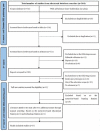A systematic review on the metaverse-based blended English learning
- PMID: 36687938
- PMCID: PMC9852895
- DOI: 10.3389/fpsyg.2022.1087508
A systematic review on the metaverse-based blended English learning
Abstract
Over the past two decades, various digital technologies have been applied to sustain higher education. As the latest emerging information technology, the metaverse has been a recurring theme to be considered as a new direction to promote blended English learning. This study aims to investigate metaverse-based blended English learning. Through a systematic review based on bibliographic and content analysis, the study attempts to integrate the evidence to generate a model that links the education-based metaverse. The metaverse platforms in which learners' academic success can be significantly enhanced due to a high degree of learner engagement in immersive virtual environments. In addition, the virtual learning experience is restricted by the degree of digital literacy at the same time. To improve instructors' and learners' digital literacy levels, necessary support is indispensable by educational institutions and designers of the metaverse platforms. Meanwhile, this study addresses potential challenges that may hinder sustaining metaverse-based blended English learning, and provides some suggestions based on the previous literature. In future research, we will keep updating and polishing the metaverse-based blended English learning research to provide more detailed guidance for researchers and educators.
Keywords: blended English learning; challenges; digital literacy; learner engagement; learning outcome; metaverse.
Copyright © 2023 Li and Yu.
Conflict of interest statement
The authors declare that the research was conducted in the absence of any commercial or financial relationships that could be construed as a potential conflict of interest.
Figures
Similar articles
-
From static web to metaverse: reinventing medical education in the post-pandemic era.Ann Med. 2024 Dec;56(1):2305694. doi: 10.1080/07853890.2024.2305694. Epub 2024 Jan 23. Ann Med. 2024. PMID: 38261592 Free PMC article. Review.
-
The metaverse in education: Definition, framework, features, potential applications, challenges, and future research topics.Front Psychol. 2022 Oct 11;13:1016300. doi: 10.3389/fpsyg.2022.1016300. eCollection 2022. Front Psychol. 2022. PMID: 36304866 Free PMC article. Review.
-
A Collaborative Metaverse based A-La-Carte Framework for Tertiary Education (CO-MATE).Heliyon. 2023 Feb 8;9(2):e13424. doi: 10.1016/j.heliyon.2023.e13424. eCollection 2023 Feb. Heliyon. 2023. PMID: 36825184 Free PMC article.
-
Systematic literature review: The adaptation of distance learning process during the COVID-19 pandemic using virtual educational spaces in metaverse.Procedia Comput Sci. 2023;216:274-283. doi: 10.1016/j.procs.2022.12.137. Epub 2023 Jan 10. Procedia Comput Sci. 2023. PMID: 36643176 Free PMC article.
-
Utilizing the Metaverse for Learner-Centered Constructivist Education in the Post-Pandemic Era: An Analysis of Elementary School Students.J Intell. 2022 Mar 7;10(1):17. doi: 10.3390/jintelligence10010017. J Intell. 2022. PMID: 35324573 Free PMC article.
Cited by
-
Comparing Learning Outcomes of Machine-Guided Virtual Reality-Based Training With Educator-Guided Training in a Metaverse Environment: Randomized Controlled Trial.JMIR Serious Games. 2024 Aug 7;12:e58654. doi: 10.2196/58654. JMIR Serious Games. 2024. PMID: 39110497 Free PMC article.
-
Beidou Navigation Satellite System metaverse resource sharing and commons sustainable development framework.Sci Rep. 2024 Sep 13;14(1):21465. doi: 10.1038/s41598-024-72652-0. Sci Rep. 2024. PMID: 39271783 Free PMC article.
-
Multiliteracies meet new methods: The case for digital writing in English education case study in G-7 countries.PLoS One. 2024 Jul 3;19(7):e0304343. doi: 10.1371/journal.pone.0304343. eCollection 2024. PLoS One. 2024. Retraction in: PLoS One. 2025 May 7;20(5):e0323479. doi: 10.1371/journal.pone.0323479. PMID: 38959239 Free PMC article. Retracted.
References
-
- Almarzouqi A., Aburayya A., Salloum S. A. (2022). Prediction of user's intention to use Metaverse system in medical education: a hybrid SEM-ML learning approach. IEEE Access 10, 43421–43434. 10.1109/ACCESS.2022.3169285 - DOI
-
- Alvarez-Risco A., Del-Aguila-Arcentales S., Rosen M. A., Yáñez J. A. (2022). Social cognitive theory to assess the intention to participate in the Facebook metaverse by citizens in Peru during the COVID-19 pandemic. J. Open Innov. Technol. Market Complex. 8, 142. 10.3390/joitmc8030142 - DOI
-
- Arnone M. P., Small R. V., Chauncey S. A., McKenna H. P. (2011). Curiosity, interest and engagement in technology-pervasive learning environments: a new research agenda. Educ. Technol. Res. Dev. 59, 181–198. 10.1007/s11423-011-9190-9 - DOI
Publication types
LinkOut - more resources
Full Text Sources
Research Materials
Miscellaneous



